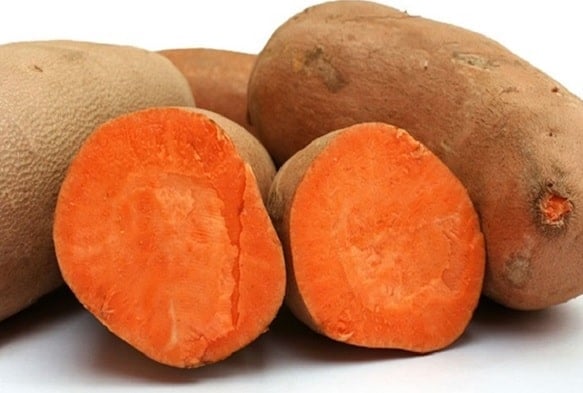Sweet potatoes are available all over the world, and if you only eat these delicious root vegetables when they’ve been baked until they are virtually unrecognizable, then you are missing out on one of nature’s greatest nutritional gifts. They are not only rich in a vast range of nutrients, but they are also one of the best natural ways to regulate your blood sugar levels, making them an exceptionally beneficial food for diabetics. It also helps that they are absolutely scrumptious, and their sweet flavor is completely unlike any other found in the vegetable world. Indeed, sweet potatoes are so versatile that they’re sure to liven up a whole range of dishes, even desserts!
Selecting and Storing Sweet Potatoes
There are different varieties of sweet potato, and many come in different colorings and hues. Here are some tips for selecting, storing and preparing the vegetable, so that you can benefit from as much goodness as possible.
- Choose the darker variety of sweet potato at the grocery store if possible, because they have the higher carotene content, essential for the production of vitamin A. Purple sweet potatoes, more commonly found in Asia, are also a great source of nutrients. Paler varieties are healthy but don’t offer quite the same number of benefits as darker types, and many people often confuse them with yams.
- Avoid wrinkly, soft sweet potatoes and take time to select ones with good, firm flesh. If there are signs of green discoloring, then leave them alone.
- Store sweet potatoes in a cool, dark and well-ventilated place. Do not leave them in plastic bags, or keep them in the fridge. Consume within 7-10 days of purchase.
- Prepare sweet potatoes in the same way you would prepare normal white potatoes. However, bear in mind that the skin contains a large percentage of the nutrients, so try to leave it on if possible. You can make fantastic sweet potato fries by leaving the skin on, and chopping the vegetable into strips.
- You can steam, bake, boil or roast sweet potatoes, and still benefit from plenty of nutrients. But as with any vegetable preparation, try not to over-cook them.

Specific Health Benefits of Sweet Potatoes
Although they are soft, creamy and sweet enough to be used in some desserts, sweet potatoes offer a surprisingly huge range of nutritional benefits, many of which have specific health benefits.
1. Great for Heart Health
The high levels of vitamin B6 and potassium found in sweet potatoes provide excellent benefits for your heart. B6 vitamins break down homocysteine, a substance which can harden blood vessels and block arteries. Potassium, meanwhile, helps balance fluid and blood pressure levels, while providing your body’s cells with electrolytes that help regulate your heart beat.
2. Great Source of Vitamin A
Sweet potatoes contain a huge amount of beta-carotene, a carotenoid that gives certain vegetables their orange color. The body can turn carotenoids into vitamin A, which is linked to cancer prevention, the maintenance of good vision, and also provides a number of anti-ageing benefits. Indeed, one large sweet potato is capable of providing 100% of your recommended daily intake of vitamin A according to the U.S. Food and Drug Administration.
3. Great for Blood Sugar Levels
Although they are sweet tasting, sweet potatoes are low on the glycemic index, which means they are a very good blood sugar regulator. Many starchy foods, including white potatoes, encourage blood sugar levels to spike and rise rapidly, but sweet potatoes release sugar into the bloodstream much more slowly. This makes them a great choice for diabetics, who can safely consume the carbohydrates without associated problems.

4. Great for Skin Care
Sweet potatoes can work to improve the appearance of your skin from both inside and outside your body. The high levels of vitamin C and E contained within sweet potatoes helps boost the body’s defenses against the sun’s harmful UV rays and encourages the production of collagen, which keeps the skin strong and supple.
But it isn’t only the consumption of sweet potatoes that can benefit your skin. If you boil them, don’t throw away the water afterwards. Take a cup and use your fingers to gently apply the water to your face. This can help clean your pores, remove impurities from the skin and even reduce dark circles around your eyes.
5. Great for Digestion
Sweet potatoes are a great source of dietary fiber, while still being low in calorie content. Fiber promotes a healthy digestive tract, helping your body pass toxins and waste products out quickly and efficiently while guarding against constipation and bloatedness.
6. Great for Emphysema Prevention
Emphysema is a condition that gradually damages the air sacs in the lungs, leaving sufferers short of breath. It is often associated with smokers, or people exposed to smoking on a regular basis. Smoking reduces levels of vitamin A, which helps regenerate the cells in the lungs. The beta-carotene contained within sweet potatoes encourages the production of vitamin A and helps heal the respiratory system.
7. Great Source of Vitamins and Minerals
Sweet potatoes contain a significant amount of vitamins C, E, B5, B6, riboflavin and copper. These nutrients offer a range of benefits for your immune system, red blood cell production, sleep patterns, mood, wound repair, disease prevention, muscle weakness and pain.
8. Great for Stress Relief
Sweet potatoes contain high amounts of magnesium, often considered to be one of the best minerals for promoting relaxation, calmness and improved mood. As we already know, they are also rich in potassium, which helps regulate your heart beat when you are anxious or stressed.









